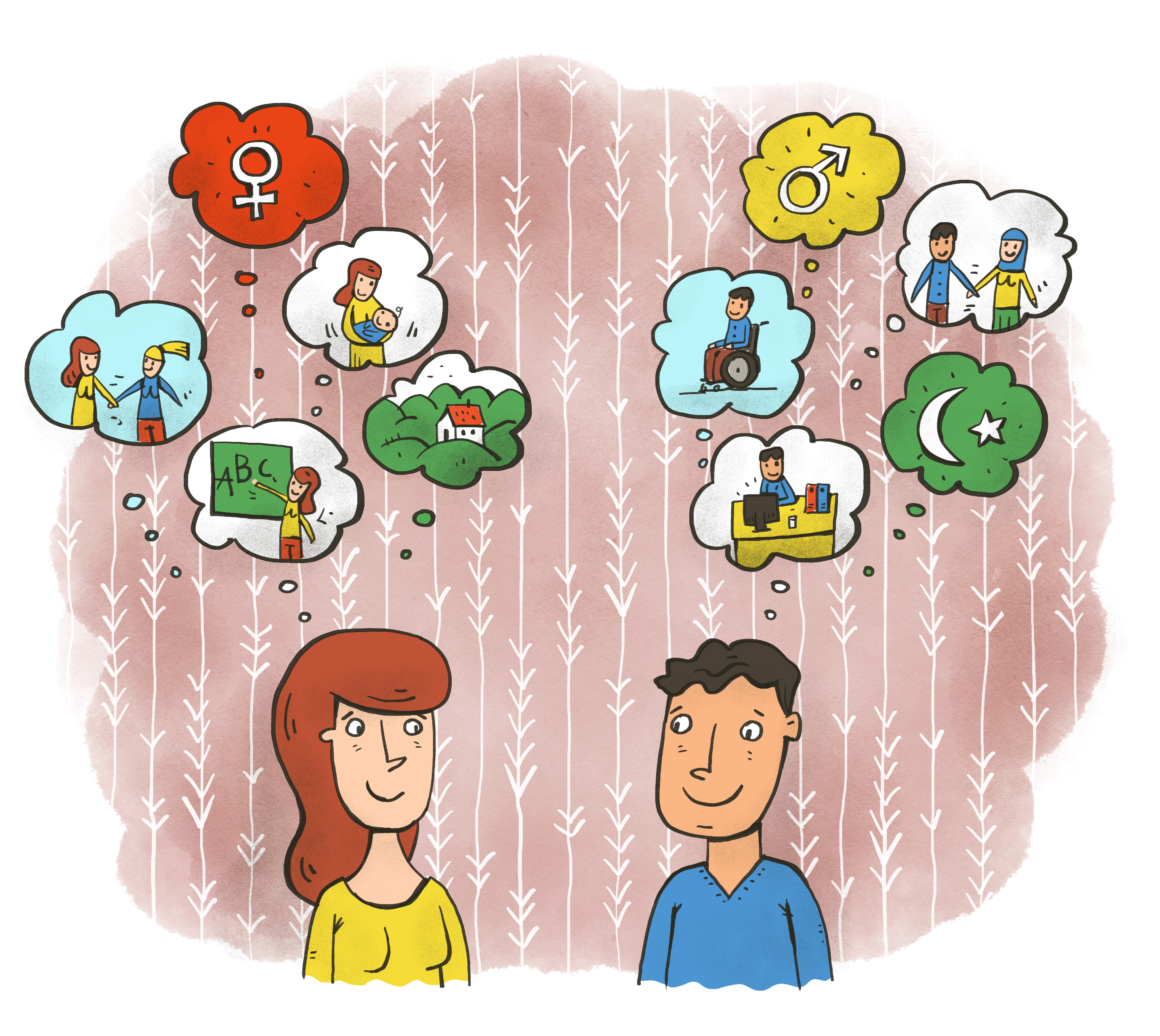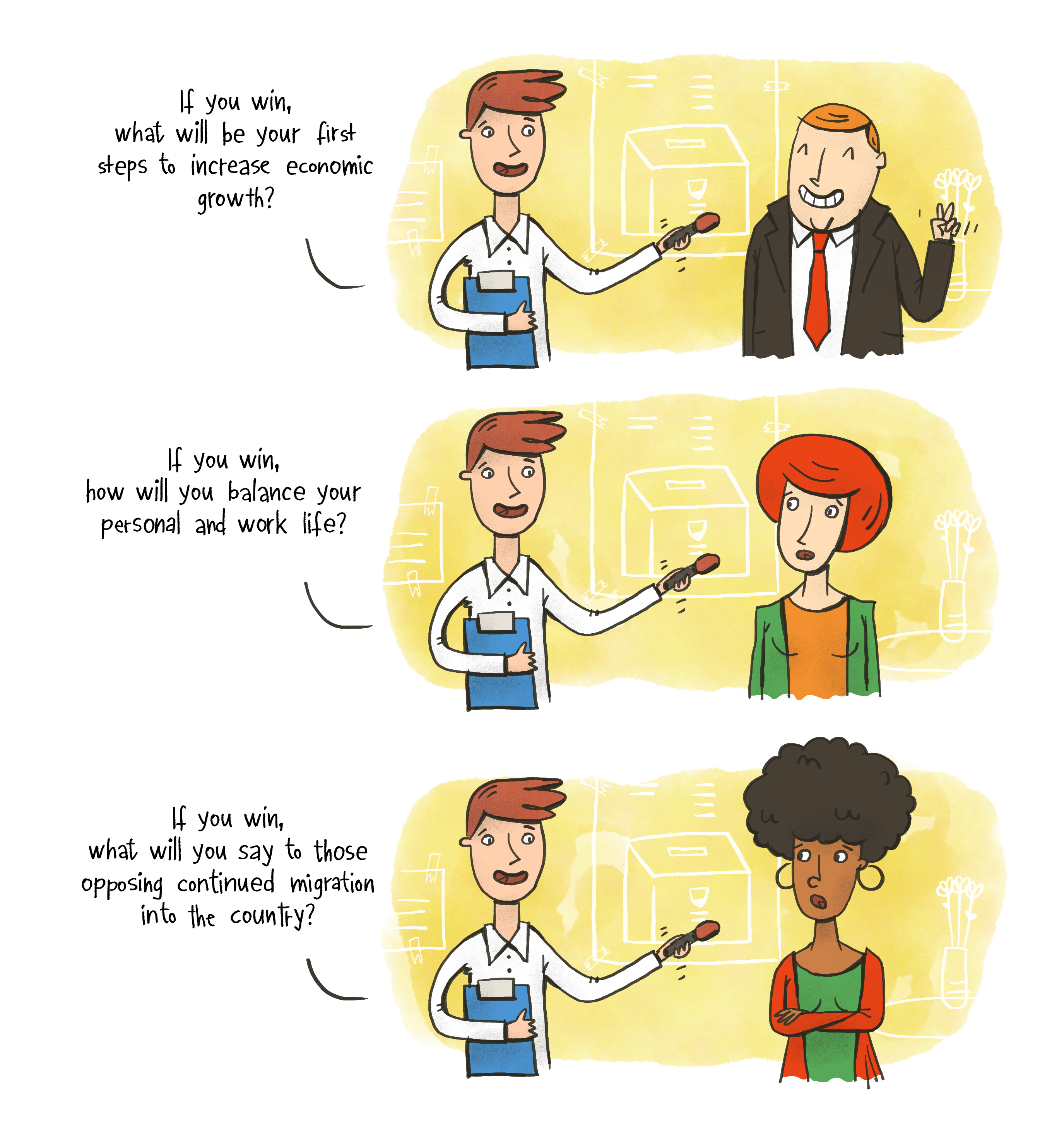6
Online training on intersectional discrimination in youth work
Online training on intersectional discrimination in youth work
Inhoud
The online training on intersectional discrimination in youth work includes 5 strands that address:
- Stereotypes, Power and Discrimination,
- Gender equality and Gender-based discrimination,
- Racism and ethnic discrimination,
- Intersectional discrimination; and
- Addressing intersectional discrimination in youth work.
The main purpose of the training is to learn about the importance and ways of addressing intersectional discrimination and intersectional justice in youth work and to acquire skills to create a safe environment for young people.
In addition, the training aims to introduce terms and concepts:
- stereotypes and prejudices and the types of discrimination based on them,
- gender equality, sexism and homophobia,
- "race" and racism, and ethnicity and ethnic discrimination,
- intersectionality.
The content of the training is based on a study of the field of intersectional discrimination, with a focus on the intersectionality of gender, race and ethnicity, on a review of the knowledge of the field among young people and youth workers in 3 countries (Slovenia, Italy, Romania), and on materials and tools in the field of intersectional, multiple discrimination. As intersectional discrimination is poorly recognised and addressed, youth workers face challenges in their work on how to act intersectionally and integrate this prism in all areas of their work. Intersectional discrimination refers to situations where an individual or group faces multiple forms of discrimination at the same time.
The content of the online training "Intersectional Discrimination in Youth Work" was developed by the Forum for Equitable Development in cooperation with project partners Global Institute, Nosotras Onlus and Asociatia Pro Democratia within the Erasmus+ project. More about the project on the website At the intersection of inequalities/discriminations.
Funded by the European Union. Views and opinions expressed are however those of the authors only and do not necessarily reflect those of the European Union or the National Agency. Neither the European Union nor the National Agency can be held responsible for them.
Activiteiten om te voltooien
Voltooi de volgende activiteiten, verdien badges en je zult de voortgang van je playlist zien
Inhoud
The aim and objectives of this section are to introduce the basic concepts and terms in the field of intersectionality. After completing this section, you will:
• be able to define basic concepts such as intersectionality and intersectional justice;
• recognise the importance of the intersection of different individual identities and the intersectional discrimination involved;
• know why it is necessary to address intersectionality to ensure intersectional justice;
• recognise intersectional discrimination and intersectional justice.
Hulpmiddelen
Ontvang een activiteitenbadge
1
Intersectional discrimination Behaal deze badge
Je moet 1 badge verdienen in dit project
The badge holder knows what intersectional discrimination and intersectional justice are and recognises them in practice, recognises the importance of the intersectionality of different individual identities and the intersectional discrimination involved, and the importance of addressing intersectionality to ensure intersectional justice.
Om deze badge te verdienen dien je 2 taken te voltooien
Taken
Taak nr.1
Bewijs bevestigd door: één activiteitenorganisator
Take the Intersectional Discrimination Quiz at the external link. You will find the answers in the published material.
As proof, please write in your answer that you have completed the quiz.
Taak nr.2
Bewijs bevestigd door: één activiteitenorganisator

People belong to different social and socially constructed categories at the same time, such as ‘race’, gender, socio-economic status, sexual orientation, disability and others, which together affect our experiences of discrimination and privilege.
We therefore have different personal characteristics/circumstances or identities.
Intersectional discrimination refers to situations where an individual or group faces multiple forms of discrimination at the same time. It refers to simultaneous effect or intersection of different discriminations. These personal circumstances, identities and social categories do not add up, but rather intersect, thus creating a ‘new reality’. This is not a simple sum of individual personal characteristics/ circumstances or individual discriminations, but a specific situation created by the simultaneous interaction of personal characteristics/circumstances and their associated discriminations.
Think about and write down an example of intersectional discrimination you have experienced or know about.
Taak nr.3
Bewijs bevestigd door: één activiteitenorganisator

Do you recognise the intersection in the illustration below? Write down your opinion.
Vaardigheden
#Encouraging young people to reflect and exchange ideas regarding issues such as solidarity, social justice, promoting/protecting human rights, discrimination, dignity and equality
ETS-TR
#Vermijdt het gebruik van methoden die impliciet stereotypen en discriminatie versterken
#Houdt rekening met en past de principes van niet-formeel leren toe bij het ontwerpen van het programma, met een bijzondere focus op 'jongerengerichtheid', 'transparantie', 'democratische waarden', 'participatie', 'empowerment' en 'sociale transformatie'
ESCO
#advocate equality of opportunity in organisations
ESCO
#advocate for human rights
ESCO
#advocate social relationships
ESCO
#arrange youth activities
ETS-TR
#Neemt passend gedrag aan dat ethische grenzen respecteert binnen een gegeven groep lerenden
ESCO
#develop youth programmes
#Encouraging young people to reflect and exchange ideas regarding issues such as solidarity, social justice, promoting/protecting human rights, discrimination, dignity and equality
ETS-TR
#Vermijdt het gebruik van methoden die impliciet stereotypen en discriminatie versterken
#Houdt rekening met en past de principes van niet-formeel leren toe bij het ontwerpen van het programma, met een bijzondere focus op 'jongerengerichtheid', 'transparantie', 'democratische waarden', 'participatie', 'empowerment' en 'sociale transformatie'
ESCO
#advocate equality of opportunity in organisations
ESCO
#advocate for human rights
ESCO
#advocate social relationships
ESCO
#arrange youth activities
ETS-TR
#Neemt passend gedrag aan dat ethische grenzen respecteert binnen een gegeven groep lerenden
#Encouraging young people to reflect and exchange ideas regarding issues such as solidarity, social justice, promoting/protecting human rights, discrimination, dignity and equality
ETS-TR
#Vermijdt het gebruik van methoden die impliciet stereotypen en discriminatie versterken
#Houdt rekening met en past de principes van niet-formeel leren toe bij het ontwerpen van het programma, met een bijzondere focus op 'jongerengerichtheid', 'transparantie', 'democratische waarden', 'participatie', 'empowerment' en 'sociale transformatie'
ESCO
#advocate for human rights
ESCO
#advocate social relationships
ESCO
#arrange youth activities
ETS-TR
#Neemt passend gedrag aan dat ethische grenzen respecteert binnen een gegeven groep lerenden
ESCO
#arrange youth programmes
#Encouraging young people to reflect and exchange ideas regarding issues such as solidarity, social justice, promoting/protecting human rights, discrimination, dignity and equality
ETS-TR
#Vermijdt het gebruik van methoden die impliciet stereotypen en discriminatie versterken
#Houdt rekening met en past de principes van niet-formeel leren toe bij het ontwerpen van het programma, met een bijzondere focus op 'jongerengerichtheid', 'transparantie', 'democratische waarden', 'participatie', 'empowerment' en 'sociale transformatie'
ESCO
#advocate equality of opportunity in organisations
ESCO
#advocate for human rights
ESCO
#advocate social relationships
ESCO
#arrange youth activities
ETS-TR
#Neemt passend gedrag aan dat ethische grenzen respecteert binnen een gegeven groep lerenden
ESCO
#arrange youth programmes
#Encouraging young people to reflect and exchange ideas regarding issues such as solidarity, social justice, promoting/protecting human rights, discrimination, dignity and equality
ETS-TR
#Vermijdt het gebruik van methoden die impliciet stereotypen en discriminatie versterken
#Houdt rekening met en past de principes van niet-formeel leren toe bij het ontwerpen van het programma, met een bijzondere focus op 'jongerengerichtheid', 'transparantie', 'democratische waarden', 'participatie', 'empowerment' en 'sociale transformatie'
ESCO
#advocate equality of opportunity in organisations
ESCO
#advocate for human rights
ESCO
#advocate social relationships
ESCO
#arrange youth activities
ESCO
#arrange youth programmes
ETS-TR
#Neemt passend gedrag aan dat ethische grenzen respecteert binnen een gegeven groep lerenden
Activiteiten: 5
Gestart: 53
Voltooide playlist: 0
Tijd om te voltooien: 4 uren 30 minuten
Delen:
Organisatoren
Forum za enakopraven razvoj
Wijzigen in een andere taal:

